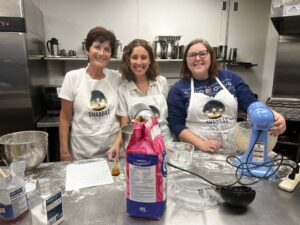JOHANNESBURG, South Africa (Press Release) – The Shabbat Project – an international movement that brings together Jews from all walks of life and all levels of observance to keep one Shabbat, celebrated in a spirit of global Jewish unity– took place on Nov. 3-4, 2023, in more than 100 countries and 1,500 cities, with more than 1,200 events and hundreds of thousands of Israelis participating throughout Israel. This year’s Shabbat Project was devoted entirely towards strengthening and unifying the Jewish people in Israel and throughout the Diaspora, in solidarity with a Jewish world still reeling from the October 7 attacks in Israel.

“I’m in awe of the people of Israel,” says South African Chief Rabbi Dr Warren Goldstein, founder of the Shabbat Project. “At a time when so many are conscripted, so many are displaced, so many are traumatized and disoriented by the attacks, Israelis demonstrate daily heroic resilience, and have shown that they want and need Shabbat, as a source of comfort and strength, and national and personal purpose.”
In San Diego, innovative Shabbat Project events such as a “Shabbat shuk” and a Shabbat meditation workshop reached thousands of Jews across the political and religious spectrum.
“Now more than ever, we need to stand together,” says Shabbat San Diego program coordinator Simone Abelsohn. “This year’s Shabbat Project could not have come at a more important time, as Jews everywhere joined together in love and solidarity to celebrate the gift of Shabbat!”
Among the events in Israel were scores of challah bakes and havdalah concerts, approved as mass gatherings by the Israel Defense Forces – including a challah bake in Eilat for hundreds of evacuees that linked up with a similar event in Tel Aviv for families of the hostages currently held in Gaza.

Special Shabbat events were held at around 100 hotels around the country that are sheltering evacuees from Sderot, while a number of regions coordinated Shabbat dinners for displaced families from the north and south of Israel, and countless families hosted evacuees for Shabbat in their homes.
Volunteers also distributed thousands of challahs, candles and Shabbat food to Israeli families with a parent drafted for military service, and delivered Shabbat meals and challahs to IDF bases. At the Merkaz Shapira base near Ashkelon, soldiers returned from Gaza for a pre-Shabbat event providing respite and inspiration.
Other initiatives included Shabbat learning programs and events in schools around the country, “mobile music cars” driving through cities to lift people’s spirits, and special Kabbalat Shabbat services for kids, families or groups of soldiers taking place in bomb shelters across Israel.
Events were coordinated by more than 200 volunteer partners, with numerous organizations involved.
“Every group we approached came on board, and it was amazing to see how quickly partners put these events together,” says Aharon Ackerman, who runs the project in Israel.
He says some Israelis left their shelters for the first time in weeks in order to be part of the Shabbat Project.
“Over the past decade the Shabbat Project has touched the hearts of millions. But this year I believe was the most important, the most special one yet. Emotions were running higher than usual.”
Itai Friedlander, who has been coordinating Shabbat Project programs under the banner of Israeli NGO, Garin Torani, shares similar sentiments.
“These Shabbat events and gestures of support gave people hope, solidarity, unity, making them feel part of the Jewish people, part of a community, even when they’ve been displaced from their homes. In previous years, the Shabbat Project has been something nice, something that brings people together. This year, it was more than something nice – it was something essential.”
That feeling was shared by Jews worldwide. More than 400 events took place across France, Switzerland and Belgium, with a focus on students and young professionals – including Strasbourg where 20 young Jewish Ukrainian refugees were formally welcomed into the community, and Nice, which hosted more than a dozen city-wide events, with many participants unaccustomed to observing even Yom Kippur.
In Latin America, organizers reported record turnouts and “unprecedented unity,” with challah bakes, Shabbat dinners, and havdalah concerts drawing participants with the message, “Stronger Together.” Panama led the way, with families throughout the country paired for Shabbat meals, and countless “Shabbat Kits” distributed.
In North America, 1,594 events were run by nearly 900 partners in every city with a Jewish community. Among them were Boca Raton, where open-invitation Shabbat meals were held in multiple apartment blocks; and Denver, where a full program of events included a Friday night dinner where each guest had the name and photo of one of the hostages on their plate.
Elsewhere in the U.S., a local lay leader from Monsey brought a busload of college students from Boston to the New York hamlet to experience their first full Shabbat, and in Atlanta, more than 1,000 guests from eight different local synagogues joined together in the Beth Jacob parking lot for an unforgettable “unity Kiddush.”
“Different ages and stages, different backgrounds, all celebrating Shabbat together and praying for Israel – it moved me to tears,” says Sarah Faige Berkowitz who helped set up the Atlanta event.
In Sydney, Shabbat Project partners JCA distributed over 10,000 candle-lighting kits through the country’s Jewish schools and synagogues, while families were urged to raise awareness of Israeli hostages in Gaza by setting an empty place at their Shabbat table and sharing a photo on social media with the caption, “Our table is not whole until our family is free.”
“When we were planning all our communication and events, we couldn’t have imagined how our world would change,” said Shabbat Project Australia chair, Daniel Sekers. “What hasn’t changed is the strength of our connection to each other within our community, and globally. Whether it’s through celebrating Shabbat together or coming together to support Israel, our bond is unbreakable.”
Elsewhere, a community-wide Friday night dinner in Tokyo dedicated proceeds towards Israel, Jewish women in Abidjan, Ivory Coast, lit candles together in honor of Israel; and, perhaps most remarkably, in Guadeloupe, an island territory in the Caribbean, the entire community kept Shabbat in solidarity with Israel.
“Ultimately, these events happening around the world are a statement that we the Jewish people refuse to be defined by the hatred of our enemies,” says Rabbi Goldstein in closing, “That while a grim battle for survival rages on, we affirm our right to live as Jews, to celebrate our values with pride and confidence, to proclaim Am Yisrael Chai!”
ABOUT THE SHABBAT PROJECT
The Shabbat Project is an international movement that brings together Jews from all walks of life and all levels of observance to keep one Shabbat, celebrated in a spirit of global Jewish unity. The Shabbat Project was founded by Chief Rabbi Dr. Warren Goldstein, who has served as South Africa’s Chief Rabbi since 2005, is a qualified dayan, and a senior member of the National Religious Leaders Council of South Africa. The Chief Rabbi has a PhD in human rights and constitutional law and is a published author of five books, the most recent of which is Shabbat: A Day to Create Yourself.